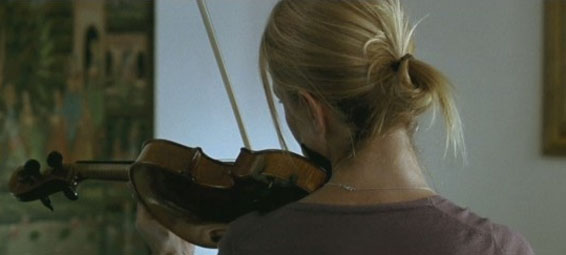“What we have here is a failure to communicate,” a frustrated imaginary bystander might say, interrupting the action of Mademoiselle Chambon by quoting Cool Hand Luke. The question, then, in this restrained romance about a musty marriage interrupted by a violin-playing school teacher that in no way resembles Paul Newman’s movie, is just why these longing, lonely, and muted hearts unintentionally collide in the romantic stratosphere. The mum man at the center of the love triangle is Jean (Vincent Lindon), whose eye catches his son Jérémy’s grade school teacher, the lovely Véronique Chambon (Sandrine Kiberlain), and who stumbles towards an affair that never quite fully blooms. It is a story of locked-up hearts, the habits of loneliness, and the way romance operates awkwardly over class and social strata. Despite working with difficult characters who bring little dynamism to the screen, writer and director Stéphane Brizé coaxes something full of emotion from these quiet, awkward lovers.
Central here is work, as we are directed in the movie’s opening scene to spend time watching Jean work. He is a construction worker who builds houses, and Brizé spends enough time showing her male protagonist lost in the quiet motions and labors of the day for us to get a feel for his world. It is pragmatic, grueling, meditative, simple, but beautiful in the methodical motion of its craftsmanship. Jean is married to Anne-Marie (Aure Atika) an attractive and playful woman with a childlike spirit and job on the assembly line in a book printing factory. In a long scene near the film’s opening, we watch Anne-Marie and Jean debate over a question in Jérémy’s homework regarding the meaning of a direct object (a clever wink that someone is going to be on the receiving end of something in this movie). It is such a slight scene, but one that subtly unfolds for us the contented dynamic of this simple, working class family, in which Jean’s studied, stoic presence almost makes him feel like a father to wife and son alike. Later on we see that his steadfast sense of duty extends to his relationship with his 80-year-old father, whom he washes, bathes, and takes to pick out coffins for his eventual burial.
At first we presume there’s something of depth behind Jean’s quiet, downtrodden eyes. It turns out that there is, but it takes an innocuous invitation from Jérémy’s school teacher to awaken it. Mademoiselle Chambon invites Jean to speak to his son’s class about his work. In the classroom he responds warmly to the children’s many questions and excited interest, and Jean seems to discover something of his love for the craftsmanship of his job while he speaks. But it is the quiet and lonely Véronique whose heart is awakened by the presence of this simple, pure-hearted man, and their romance begins to take shape. She invites him over to fix a drafty window, and he asks her to play violin for him. They both begin to lose themselves in the music, and its beauty stirs something in Jean that has been long dormant.
The great tension in Mademoiselle Chambon revolves around the eventual consummation of this relationship. Véronique becomes Jean’s Eurydice, and there is a pervading sense throughout that this is one of those attractions that will unveil for both characters what they are and can’t realize and what they desire but can’t have. Jean is torn between duty and a blossoming sense of self, a tension that sheds light on the contradiction of the worker-craftsman, whose art is enshrined in the practical. At times these quiet characters can feel flat and the movie evenly-paced to a fault. But like a piece of music, Brizé’s film’s strength is in the coloring of its tones and textures. Madamoiselle Chambon is a melancholic serenade, with an ending that, if you allow yourself to get lost in its music, will have you gripping your seat, heart in throat.






